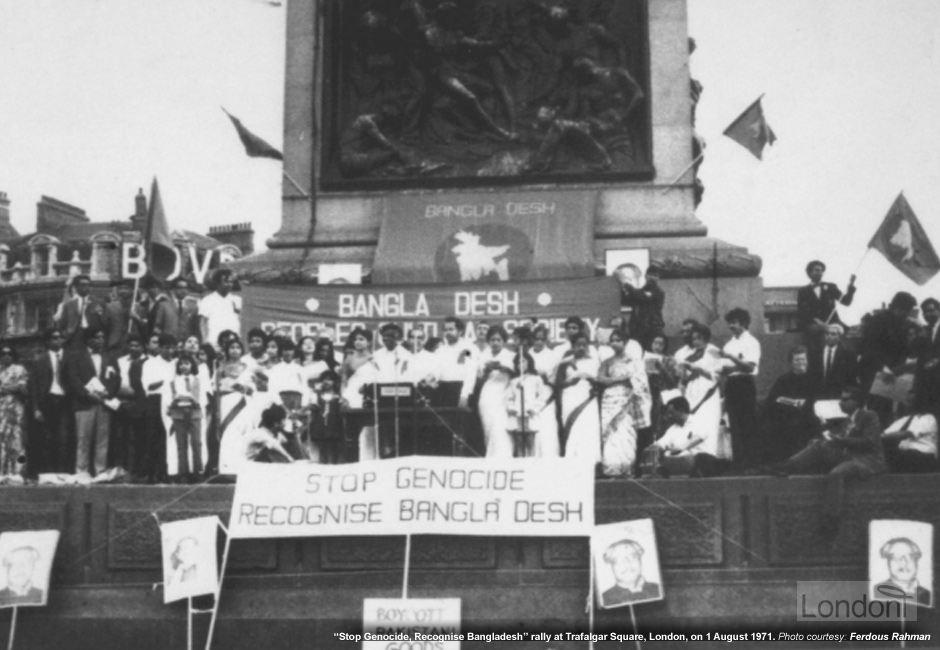
UK mission
Last updated: 5 October 2017 From the section 1971 Muktijuddho
In 1971, as is the case now, the largest concentration of probashis were based in UK. Here the community rose to sensitize the British Government and public opinion in favour of the Bengali cause. However, with the Bengali Deputy High Commissioner of Pakistan refusing to switch his allegiance, it was left to 50-year-old Justice Abu Sayeed Chowdhury to rise to the occasion. He was designated as the principal overseas spokesman of the Mujibnagar Shorkar and appointed as Ambassador-at-large. Once other Ambassadors were gradually appointed, he was given the specific task of leading the diplomatic offensive in UK, West European countries and at the UN in New York with his headquarter in 11 Goring Street, Aldgate, London.
'Stop Genocide Recognise Bangladesh' rally in Trafalgar Square
On Sunday 1 August 1971 a "Stop Genocide Recognise Bangladesh" protest rally was held in the historic Trafalgar Square, London. It was attended by thousands of people demanding peace and justice in Bangladesh and recognition of the new nation.
Justice Abu Sayeed Chowdhury gave a 15-minute opening speech which was followed by showcase of an eye witness tape. Following this, speeches were delivered by prominent politicians and activists including Reginald Ernest Prentice MP (one of the 4 MPs who visited both Pakistan and Bangladesh), Reverend Kenyon Wright (who lived 15 years in West Bengal and visited Bengali refugee camps in India), John Stonehouse MP (then a Labour MP who made two visits to refugee camps in India and also visited Bangladesh), Lord Fenner Brockway (one of the first people to condemn the Pakistani atrocities), MP Thomas Williams MP (who defended Sheikh Mujibur Rahman in the Agartala Conspiracy Case in 1969), and Paul Connett (spokesman for Action Bangladesh), amongst others.
The event culminated with a protest march to 10 Downing Street, the home of the British Prime Minister, where a petition letter was delivered to PM Edward Heath requesting British reparation in the event in Bangladesh. The letter was signed by over 200 Members of Parliament including 11 Privy Councilors and over 30 former ministers.
Whilst we all applaud your decision not to send further economic aid to Pakistan until a political settlement is reached in East Bengal, it is clear that this act alone has not deterred the Pakistan military regime from its mad attempt to suppress militarily the democratic will of the 75 million Bengali people.
We therefore appeal to you to take the following positive steps to stop Pakistan's genocide of the Bengali people.
Firstly we ask you to honor Britain's commitment to International Law by bringing Pakistan's military action against the unarmed Bengali people before the United Nations Security Council as a contravention of the UN Genocide Convention Article II, Subsections (a), (b) and (c). (Britain added her name to the Convention in 1970).
Secondly we ask you to use your influence with the American government to get them to discontinue their arms shipments to West Pakistan.
Thirdly we ask you to recognize the provisional government of the Republic of Bangladesh since it is clear that this is the only peaceful and diplomatic method left to bring the West Pakistan regime to its senses.
...We ask these things not only in the name of the 100,000 Bengali residents of Great Britain, whose friends and families are being terrorized and slaughtered, but also in the name of every human being, because if this policy of genocide is allowed to continue unopposed it will change the kind of world we live in.
Finally. Mr. Heath, we ask you to do these things because Britain bears a special responsibility to the Indian sub-continent in this matter since it was Britain who played a major part in the establishment of Pakistan some 23 years ago. If India is forced to go to war in order to solve the massive problem confronting her, Britain will share the blame if we have failed to take these elementary steps.
Whilst we appreciate any government's reluctance to sanction further 'fragmentation' we hope that you agree that the physical elimination and suppression of peoples, if accepted, will endanger our planet far more than the realistic rearrangement of arbitrary boundaries in response to the clearly expressed will of the people who live within them.
Extract from the letter delivered to PM Edward Heath on 1 August 1971
27-year-old Bengali becomes first diplomat in Europe to switch allegiance
Another event took place within the Trafalgar Square rally on 1 August 1971 which was to have a profound effect and reverberate worldwide.
In a dramatic move, 27-year-old Mohiuddin Ahmed, Second Secretary in Pakistan High Commission in London became the first diplomat in Europe to declare his allegiance to Bangladesh when he openly resigned front of the grand rally at Trafalgar Square. Mohiuddin Ahmed delivered a riveting speech to tell people around the world why Bangladesh was waging war to be free. He had intended to switch allegiance on 10 April 1971 - the day the Mujibnagar Shorkar was originally formed - however, Justice Abu Sayeed Chowdhury told him to wait "until more things were put into place". Now, three-and-half-months later, the time had come. Immediately after resigning, Mohiuddin Ahmed spent some time with his heavily pregnant wife and awaited further instructions.
I had wanted to resign much earlier, on 10 April 1971 to be precise, when I had first met Justice Chowdhury at BBC's Bush House, where he had gone to give his first interview to Peter Gill of the Daily Telegraph. Justice Chowdhury had restrained me saying that he had to orgainse himself first and then at an appropriate time he would send me the signal to join him.
The next morning [i.e. 2 August 1971] the Pakistan High Commissioner [Salman Ali] called me and told me "forget what happened yesterday, come back, join us" and I very politely but strongly declined. But then he called me again after two hours and asked me to return my diplomatic passport as well as that of my wife's. They even wrote to the London Transport Authority advising them to take back my diplomatic licence because I was no longer a diplomat. And it’s true that yes, once I left the Pakistan High Commission, I did not hold diplomatic status anymore because Bangladesh was not recognised.
Mohiuddin Ahmed's high profile switch caused a media stir and great excitement in UK and inspired other Bengalis to follow suit. Mohammed Akbar Lutful Matin, Director of Audit and Accounts switched allegiance on 4 August 1971, three days after Mohiuddin Ahmed. Five Bengalis at the High Commission in London also followed his example in the following months and resigned. These included Habibur Rahman (Education Officer) and Fazlul Huq Chowdhury (Assistant Press Attaché) who joined the Mission in London.
The only high profile Bengali member to continue working for the Pakistani government was the Deputy High Commissioner.
 Mohiuddin Ahmed ()
Mohiuddin Ahmed () 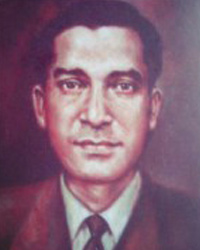 Habibur Rahman () Education Officer in Pakistan High Commission in UK
Habibur Rahman () Education Officer in Pakistan High Commission in UK Fazlul Huq Chowdhury ()
Fazlul Huq Chowdhury ()
Elsewhere, Fazlul Karim (Second Secretary in Cairo), Mohiuddin Ahmed Jaigirdar (Third Secretary in Lagos), Syed Amirul Islam (Third Secretary in Tunis), Abul Fateh (Pakistan's Ambassador to Iraq) severed links with Pakistan Government and travelled to London and joined the Mission. Counsellor M. M. Rezaul Karim - who would famously receive Sheikh Mujibur Rahman in London after his release in January 1972 - also became a member on 7 October 1971, as did Pakistan's Ambassador to Argentina, Abdul Momen on 11 October 1971.
By the end of 1971 about 20 Bengali officers and staff had joined the mission in London including Abdur Rouf, Deputy Director, Films and Publication who joined on 8 August 1971.
For a short time, these brave individuals were men without a country.
I was not a Pakistan citizen, or a Bangladeshi at the time, and I was not British. We used to call ourselves the 'beggar's brigade' in London with no citizenship. It didn’t worry us really and I didn’t fear being deported. We were aware that while the UK was not openly supporting us, they had all their sympathies for us.
 M. M. Rezaul Karim (- 2005) Ambassador and Bhasha Shoinik. Began career as Foreign Service officer of 1959 batch. Served as Counsellor in Pakistan Embassy in London before switching allegiance to Provisional Bangladesh Government-in-exile where he served as Deputy Chief of Bangladesh Mission in London. Left in charge of Mission after Justice Abu Sayeed Chowdhury returned to Bangladesh following independence. Received Sheikh Mujibur Rahman from Heathrow Airport on 8 January 1972 following his release from Pakistani jail. He was first to apprise Sheikh Mujib regarding Swadhinata Juddho http://www.flickr.com/photos/menik/4261617426/. Career highlight post independence include Head of the European Division in the Foreign Ministry, establishing Bangladesh Mission in Saudi Arabia, becoming Deputy High Commissioner in New Delhi, serving as Bangladesh Ambassador to China, Iraq, Iran, and Soviet Union and as High Commissioner to Sri Lanka and United Kingdom. Retired in 1992 and joined politics, becoming a member of the Advisory Council of the BNP, a move that shocked his colleague as he previously had strong relationship with Awami Leaguers. Returned to diplomatic arena in 2005 and became Bangladesh Ambassador to Cairo. Among the Bangladesh Foreign Service officers, he has probably served as Ambassador to the largest number of countries http://www.flickr.com/photos/menik/4261617426/. Other achievement include becoming President of Bangladesh Commonwealth Society, and Chairman of PKSF (Palli Kormo-Sahayak Foundation), Presidents of Swanirvor Bangladesh and Kushtia District Association and many other social organisations. Also a member of International Observer Groups, which monitored elections in Sri Lanka, Cameroon and Pakistan. Wrote two autobiographical books "Kutniteker Abhigotta" and "Kutinitiker Diary"
M. M. Rezaul Karim (- 2005) Ambassador and Bhasha Shoinik. Began career as Foreign Service officer of 1959 batch. Served as Counsellor in Pakistan Embassy in London before switching allegiance to Provisional Bangladesh Government-in-exile where he served as Deputy Chief of Bangladesh Mission in London. Left in charge of Mission after Justice Abu Sayeed Chowdhury returned to Bangladesh following independence. Received Sheikh Mujibur Rahman from Heathrow Airport on 8 January 1972 following his release from Pakistani jail. He was first to apprise Sheikh Mujib regarding Swadhinata Juddho http://www.flickr.com/photos/menik/4261617426/. Career highlight post independence include Head of the European Division in the Foreign Ministry, establishing Bangladesh Mission in Saudi Arabia, becoming Deputy High Commissioner in New Delhi, serving as Bangladesh Ambassador to China, Iraq, Iran, and Soviet Union and as High Commissioner to Sri Lanka and United Kingdom. Retired in 1992 and joined politics, becoming a member of the Advisory Council of the BNP, a move that shocked his colleague as he previously had strong relationship with Awami Leaguers. Returned to diplomatic arena in 2005 and became Bangladesh Ambassador to Cairo. Among the Bangladesh Foreign Service officers, he has probably served as Ambassador to the largest number of countries http://www.flickr.com/photos/menik/4261617426/. Other achievement include becoming President of Bangladesh Commonwealth Society, and Chairman of PKSF (Palli Kormo-Sahayak Foundation), Presidents of Swanirvor Bangladesh and Kushtia District Association and many other social organisations. Also a member of International Observer Groups, which monitored elections in Sri Lanka, Cameroon and Pakistan. Wrote two autobiographical books "Kutniteker Abhigotta" and "Kutinitiker Diary"
'Bangladesh Mission' formed in London
Around mid-August, Justice Abu Sayeed Chowdhury summoned Mohiuddin Ahmed in one evening at his home in north London to collect some fund which was to be put towards the functioning of the proposed Bangladesh mission in London. The cost of running the mission was calculated to be £2,500 per month - a huge sum even by today's standard. Thankfully, a very generous silent donator, referred to as 'Mr Subid Ali', gave the mission £5,000 cash to fund it for two months.
Mr Justice Abu Sayeed Chowdhury had the personnel for his proposed diplomatic mission, he had a venue also, but where to find the fund to run the mission? At his instruction we had made an estimate of the barest minimum costs for rent, telephone, stationary and subsistence allowance for the skeleton staff, and it came to about £2,500 a month.
We had Bangladesh Fund where to, so to say, all Bengalis of erstwhile East Pakistan were donating on a weekly basis. This fund by then had accumulated several hundred thousand pounds. But Justice Chowdhury would not make any expenditure out of this fund except for war purposes. He had assured me earlier that he would raise the fund for the diplomatic mission separately.
Justice Abu Sayeed Chowdhury had instructed me to ask Lutful Matin also to be present that evening at his residence.
At the appointed time of the day, we made it to his house separately from our houses in two different locations of London. Justice Chowdhury was living in this temporary house with his wife and their three minor children.
That evening we found another guest, Dr. Musharraf Hossain Joarder, apparently waiting for us at the residence of Justice Chowdhury. In between tea and snacks, Justice Chowdhury gave me in a sheaf of high denomination notes £5,000 to meet the expenses of the diplomatic mission for about two months and asked Matin to give a receipt to Dr. Joarder for this amount. When I asked him who the donor of this amount we should mention in the receipt, he replied that it would be in the name of Mr Subid Ali.
The name, quite unknown to me and Matin, made us stare at each other for a few brief moments. Then I mustered some courage and politely sought some further information of this Mr Subid Ali from Justice Chowdhury. He dismissed us in one brief sentence, 'you will know about him in course of time.' So that was the end of the discussion on Mr. Subid Ali. Neither I nor Matin raised the subject again with Justice Chowdhury.
In the morning of Friday 27 August 1971 the 'Bangladesh Mission' was set up clandestinely at 24 Pembridge Garden, Notting Hill Gate, London. A large crowd were present to bless it, including Bengali members of staff who were still working with the Pakistan High Commission. The inaugural function was presided over by Justice Abu Sayeed Chowdhury and key speakers included Peter Shore MP, John Stonehouse MP, journalist Anthony Mascarenhas who famously published his published his 'Genocide' article two months earlier in the Sunday Times and prayed for the success of the mission, and Simon Dring who was the first journalist to give an eyewitness account on the scale of terror and mass killing during Operation Searchlight and published a long report in the Daily Telegraph on 30 March 1971.
The Bangladesh Mission in London became the first overseas mission (after Kolkata) and was tasked with coordinating the activities of Bengalis throughout Europe and America. It became the address of all Bengali diplomats around the world who were resigning from their posts.
It brings tears to my eyes when I remember that some Bengali members of staff who were still with the Pakistan High Commission in London had the courage and patriotism to be present in that August morning to express their solidarity with us.
...When in the middle of 1971, our Liberation War had gained momentum, he [Justice Abu Sayeed Chowdhury] decided on the course of the diplomatic offensive in London where most countries of the world had representations and therefore a fitting place to project our cause and our sufferings in the hands of the Pakistan occupation army in Bangladesh.
... It [Bangladesh Mission at Notting Hill Gate] was well connected by bus and underground train services and therefore easily accessible to our people coming from other areas of London and beyond. In the selection of this venue which subsequently became the Bangladesh centre and continues to be so as our acquired property, Mr Donald Chesworth, then the president of War on Want and one of the three trustees of our Bangladesh fund, played a mighty big role. The other two trustees were Justice Abu Sayeed Chowdhury and Mr. John Stonehouse then a Member of the British House of Commons. He was one of our British heroes in 1971.
In a last ditch attempt to scupper development, Pakistan's High Commissioner in UK, Salman Ali, a Punjabi, had gone to the British Foreign and Commonwealth office on that same morning to protest the opening of Bangladesh Mission. However, he was left deeply ashamed when the British Minister of State, Joseph Godber, dismissed him saying that the Bengalis were not violating any British law and the British government was not recognising the Bangladesh Mission therefore the Pakistani High Commissioner did not have any point to complain about. This, along with the formation of the Bangladesh Mission, received good coverage in the British newspapers the following day, adding to the embarrassment of the Pakistani government whilst boosting the morale of an anxious Bengali community thousands of miles away from their ancestral home.
Few weeks after the establishment of the Mission, Justice Abu Sayeed Chowdhury led a 12-member high-level delegation to the UN General Assembly to lobby the Bangladesh cause. Professor Rehman Sobhan was one of those members. The eminent Bengali economist had toured Europe and America as representative of the provisional government. In Washington, he met with officials of the World Bank and media personalities and in Paris he met with members of aid consortium urging them to stop financing Pakistan government in view of inhuman activities carried out by Pakistan government in Bangladesh.
Professor Rehman Sobhan delivered a lecture on liberation movement in many places in London. His write-up in the Guardian gave clear picture of Yahya Khan’s genocidal activities in East Pakistan. Particularly his write-up in New Statesman entitled ‘The Corpse in the Sun’ was significant indeed. His role as roving Ambassador of the provisional government was highly appreciated.
Identity revealed of large donor
Following the independence of Bangladesh, on 6 January 1972 Justice Abu Sayeed Chowdhury revealed the identity of the secret donor who had funded the formation of the Bangladesh Mission in London.
It was 6 January 1972 evening. I was doing some work at my desk in the Bangladesh mission at 24 Pembridge Garden when I was summoned by Justice Chowdhury at his office on the same ground floor.
Mr. Chowdhury would be leaving for Dhaka the following morning. In the meantime we had observed our victory day at our mission on 16th December in the presence of a huge media crowd. Mr. Chowdhury for most part of first three weeks of December was in New York, attending the Security Council and General Assembly debates of the United Nations.
When I entered his room, Mr. Chowdhury motioned me to sit. I took a chair and saw a stranger on another chair next to me.
Mr. Chowdhury opened the talk. "Do you remember you had asked me who Mr. Subid Ali was when I had handed over £5,000 to run this mission?" Yes Sir, I do member that evening in early August last year, I replied.
"Here is Mr. Subid Ali now sitting beside you. His real name is Mr. Zahurul Islam. He has been living in London for the last few months anonymously with the help of Dr. Joarder. He had fled Bangladesh feigning illness leaving behind his wife and children. Dr. Joarder has been keeping him in the Backenham Hospital under his care as a patient".
I did not member that I had seen Mr. Zahurul Islam before. But that evening, in my first ever meeting with him, I bowed my head to him in deep and profound respect for that big grant he had made for our diplomatic mission. More important than the amount was the gestures of his patriotism for Bangladesh and love and respect for Mr. Justice Abu Sayeed Chowdhury to whom he had extended support in many other forms in those days of our trials and tribulations in 1971 in a foreign land.

USA mission
Outside of Kolkata, the largest diplomatic offensive was in Washington DC, USA. On 4 August 1971, all Bengali diplomats and members of the staff of the Pakistan Embassy en masse publicly severed their links with Pakistan and declared their allegiance to Bangladesh. They formed a solidarity group called 'Bangladesh Mission (Washington)' consisting of, amongst others, Enayet Karim (Minister and Deputy Chief of Mission), SAMS Kibria (Political Counsellor), AMA Muhith (Economic Counsellor, later Finance Minister of Bangladesh), Abu Rushd Matinuddin (Education and Cultural Counsellor), Ataur Rahman Chowdhury (Finance and Accounts Officer), and Syed Muazzem Ali (Third Secretary). In addition, three locally recruited Bangali officials, A. M. Sharful Alam (Assistant Administrative Officer), Sheikh Rustam Ali (Assistant Information), and Abdur Razzaque Khan also joined this group, as did Aftabuddin (Member of Staff), Sulaiman (Personal Assistant), M. Hoque (Personal Assistant), Nurul Islam (Assistant Defense Wing) and Mustaq Ahmed (Assistant Administrative Wing).
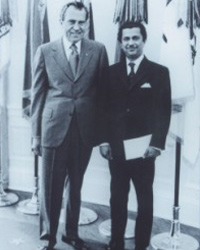 Enayet Karim ()
Enayet Karim ()  A. M. A. Muhith () Economic Counsellor of Pakistan Embassy in Washington DC.
A. M. A. Muhith () Economic Counsellor of Pakistan Embassy in Washington DC.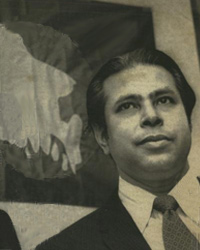 SAMS Kibria ()
SAMS Kibria () 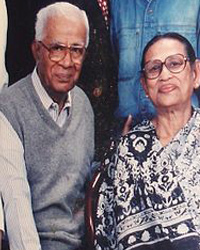 Abu Rushd Matinuddin ()
Abu Rushd Matinuddin ()  Ataur Rahman Chowdhury ()
Ataur Rahman Chowdhury () 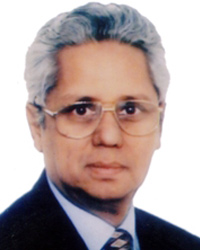 Syed Muazzem Ali ()
Syed Muazzem Ali ()
Remarkably, Enayet Karim, who had joined Pakistan Foreign Service in 1952 (during the height of Basha Andolon) after serving for a short period as a lecturer in Economics, Dhaka University, declared his severance from Pakistan while recovering from a massive heart attack in Sibley Memorial Hospital in Washington DC - his second attack within two months.
It needs to be underlined here that Enayet Karim who had suffered two severe heart attacks in 1971 declared his allegiance from the Cardiac Care Unit (CCU) at the hospital, and was represented by his wife Hosne Ara Karim at the press conference where the announcement was made. The group had requested him to defer his defection till he was released from the hospital, but he did not agree.
Syed Anwarul Karim also decided to join the Washington group. Being the senior-most among the group, he led everyone at the Press Conference at the Washington National Press Club. Subsequently, he headed the Bangladesh Mission to the UN in New York and was aided by A. H. Mahmood Ali who organised meetings with important personalities in the United Nations and New York news media for Justice Abu Sayeed Chowdhury.
This unprecedented "Mass Defection" had profound impact in Washington DC and beyond, especially in view of the fact that the Nixon administration had fully sided with the military regime of Yahya Khan. This defection also greatly encouraged our friends in the US Senate, House, press and news media and people in all walks of life to strengthen their resolve to support our cause.
Mustafizur Rahman Siddiqui, a ranking elected Member of the National Assembly, was sent by the Provisional Government to head the Washington Mission. The Mission actively lobbied with US Senators and Congressmen and succeeded in stopping all military and economic assistance to Pakistan when the Senate adopted the famous Saxbe- Church bipartisan amendment in November 1971. The Congress had also adopted a similar Gallagher amendment earlier. The American news and print media were regularly briefed and they gave prominent coverage to our war.
That by the activities of the diplomats Pakistan government was shaken had been reflected in briefing by Director General of External Publicity Wing of Pakistan Dr Moqbul Bhatti on 16 August 16 1971 in Islamabad. Dr Moqbul Bhatti regretted about the decision of his colleagues, but said that the situation would be normal in East Pakistan soon. The reason of worry of the Pakistan government was that these senior diplomats were based in American capital. In an editorial, the Guardian [British newspaper] on 9 August 1971 said "There is a powerful witness. Diplomats are normally among the last people to resign. When it happens it commands attention".
Mohammad Amjad Hossain, retired diplomat who was then an officer and present at the briefing
The Washington Mission also received important support from Dr. William B. Greenough and other Doctors who had been working at the then world leading SEATO Cholera Research Laboratory (CRL) in Dhaka (later renamed the International Centre for Diarrhoeal Disease Research, Bangladesh or ICDDR,B). Some of these doctors were eye witness to the carnage in Dhaka and sensitized their elected representatives about the ongoing genocide in Bangladesh. The Mission also received full cooperation of 'probashis' (Bengali expatriates) who had set up Bangladesh Associations in various states and maintained pressure on their senators and congressmen.
The "unofficial" contacts with the State Department, AID and World Bank officials were fully maintained by the "defecting" diplomats and these proved extremely useful.
Enayet Karim unveiled his future plans to a group of students and newsmen in the campus of an east coast university in America. A Bengali activist in America has written an eyewitness account of that tumultuous meeting. A West Pakistani member of the audience demanded angrily of Mr. Karim, "Is Islam dead? Can it no longer keep Pakistan united?" Enayet Karim replied with his legendary eloquence, "The Islam that was born in 1947 is dead. But the Islam that was born 14 centuries ago is very much alive and will continue to live and thrive a lot better in an independent, secular and democratic Bangladesh than in a Pakistan groaning under the heels of military dictatorship".
Feroz understood that communications was the biggest tool to fight against Pakistan. He wanted to provide radio station machine. When I asked him how I could help him, he said he would hand over the machine to us and we would send it to Kolkata for setting up transmission centre there. Eventually he managed the machine in June and we handed it over to supply mission of India to send it to Kolkata. I, Harun and Razzak carried 40 tonnes of materials from airport to supply mission in Washington in our three cars...I had Mercedes 250 and other two had a Buick and a Voxwagon. It took us two to three days to carry all the material. We contacted several Bangladeshis including architect Fazlur Rahman to fund us for the machine and many of them gave us dollars.
The United States, however, was still divided along party lines - the Republicans under Richard Nixon were pro-Pakistan while the Democrats supported the Bangladesh liberation movement. Nevertheless, most Americans were sympathetic to Bangladesh’s cause.
I should not say they [the American public] were supportive to Bangladesh but they were against the US policy. Only 4 or 5 US journalists supported the US policy and the rest opposed it. Many members of Congress and Senate including Kennedy opposed the US policy. Out of 222 resolutions taken on the US policy towards Pakistan in the both Houses, only 18 were favourable to policy and rest opposed it.
The Soviet Union was highly sympathetic to the Indian stand on Bangladesh but K. M. Shehabuddin expresses shock when the Soviet ambassador to India declines talking directly to Bangladesh’s foreign secretary, Mahbub Alam Chashi, and instead wants to hold talks at the office of the Indian foreign secretary, J.N. Dixit.
